Japan's Official Development Assistance White Paper 2013
Section 4 New Areas of Cooperation
With the great changes that have come to our lives through the widespread use of satellite communications and the Internet, the areas in need of international cooperation have expanded from small farming villages to outer space and cyberspace. On our seas as well, new issues for the international community such as maritime terrorism and piracy call for more strategic assistance for developing countries.
1. Cooperation in Outer Space
Assistance for developing countries using space technology takes various forms. Examples of Japan's cooperation include natural disaster management, forest resources management, watershed management, capacity building in analysis and planning, and topographic mapping. Information sent from satellites is useful for disaster risk reduction and environmental protection, as well as human resource development in developing countries. When a disaster strikes, a broad scope of information on weather conditions and damages becomes invaluable for evacuation orders and for recovery activities in the affected regions. Additionally, changes in the vegetation and land area of forests which have impacts on climate change can be grasped quickly through satellites, and this information can be used as reference for policy making.
Examples include the support for Pakistan in 2010 after heavy rain caused the Indus River to overflow, and triggered the worst flood damage in the nation's history. In July 2011, the project for "Strategic Strengthening of Flood Warning and Management Capacity" was implemented in collaboration with UNESCO using Grant Aid for Disaster Risk Reduction and Reconstruction. Through this assistance, a flood forecasting system was introduced, flood hazard maps were created, and training to facilitate these measures was conducted. Additionally, the Japan Aerospace Exploration Agency (JAXA) assisted the project by providing satellite rainfall data, developing land surface elevation information using ALOS (Advanced Land Observing Satellite) called "Daichi," and mapping the regions that were flooded in 2010. In Pakistan, which is located in the Indus River Basin, flood damage of a similar scale is predicted for the future. Therefore, this type of assistance is expected to be useful in accurately relaying flood information to residents of the region, as well as for improving flood forecasting and early warning capacities of the government.
For the heavy flooding that occurred in Thailand in 2011 as well, flood observation image from satellites is being used in the project for revising the master plan for the Chao Phraya River Basin, which was formulated with assistance from JICA in 1999 (See article regarding flooding in Thailand).
Satellite image is not only used for coping with natural disasters, but also for environmental protection in developing countries. In Brazil, a project using ALOS image for preserving the Amazon forests and preventing illegal logging was conducted with the purpose of improving monitoring capacity. An advantage of ALOS information is that it is not affected by cloud cover. By analyzing these images, the specific regions of deforestation in the expansive Amazon can be identified. Additionally, necessary information to crack down on illegal logging can be distributed in order to suppress deforestation. Year-round monitoring was made possible with assistance from Japan, as the Government of Brazil had been unsuccessful in their efforts until then. During the 1-year period of the cooperation from August 2010 to July 2011, the land area affected by logging in the Amazon rainforest (including both legal and illegal logging) was decreased by 11% (Information on the Amazon forest and satellite data is introduced in the column).
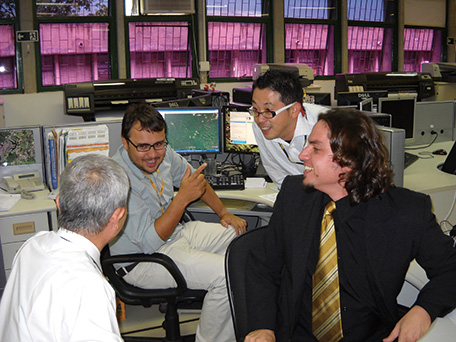
Japan working together with Brazil to find illegal logging in the Amazon forest using satellites. (Photo: JICA)
2. Maritime Cooperation
Maritime assistance for developing countries through ODA has thus far been conducted in various countries. However, in recent years, ODA has been used more strategically from the viewpoint of ensuring the safety of the Sea Lines of Communication linking directly to Japan's national interests. This is conducted in the form of countermeasures against terrorism and piracy, etc. In particular, with regard to securing maritime safety, assistance has been expanded from the Straits of Singapore and the Malacca region of Southeast Asia, where aid was focused up to the 2000s, to the Indian Ocean around the East African regions where there have been frequent acts of piracy in recent years. In East Africa, (Somali coast, Gulf of Aden), the number of piracy incidents have increased sharply since 2007, before which the number of cases had remained below 50 per year. For three consecutive years since 2009, the number of incidents has exceeded 200 annually. Various countries have dispatched military ships and aircrafts to escort commercial ships and to enhance maritime policing and monitoring activities. Japan has also dispatched two destroyers carrying officers of Japan Coast Guard and two patrol aircrafts of Maritime Self Defense Forces since 2009. In terms of ODA, $14.6 million was contributed to the fund established by the International Maritime Organization (IMO) based on the Djibouti Code of Conduct adopted at the Djibouti Meeting convened in 2009. With this, Piracy Information Sharing Centers in Yemen, Kenya, and Tanzania were established to encourage the surrounding countries to share information on piracy cases. Additionally, a training center is being constructed in Djibouti to improve the maritime law enforcement capacity of the countries surrounding Somalia (Kenya, Tanzania, Seychelles, etc.). JICA has invited maritime safety personnel from Djibouti and the surrounding countries to participate in training for fighting maritime crime and also provides assistance for enhancing the abilities of the Djibouti Coast Guard.
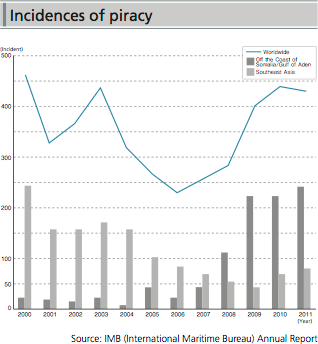
As a maritime nation, Japan has a high level of expertise in this type of maritime safety assistance. In particular, developing countries have great expectations for technical cooperation projects using the knowledge and experience of the maritime safety experts in the Japan Coast Guard, etc. (See "Malaysian "Umizaru" Divers Protect International Shipping Routes")
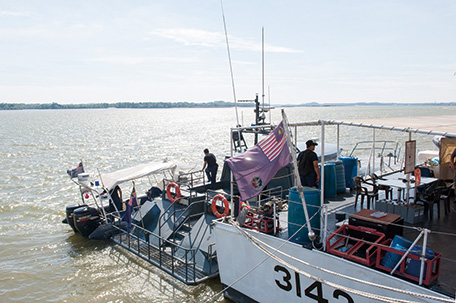
Patrol vessel of the Malaysian Maritime Enforcement Agency (Photo: JICA)
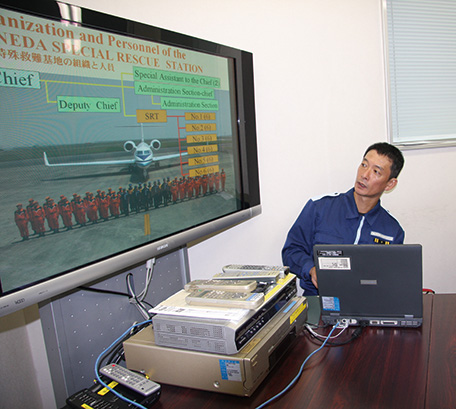
Training at the Haneda Special Rescue Station of the Coast Guard Headquarters. (Photo: JICA)
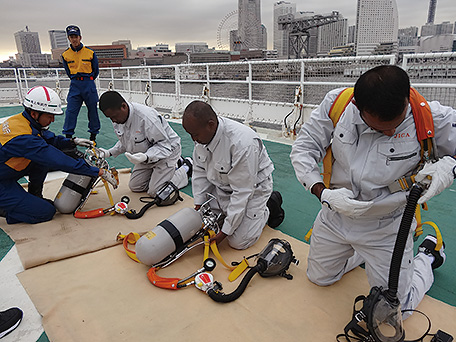
During training with the Japan Coast Guard, African trainees practice putting on breathing apparatus to be used during fires. (Photo: JICA)
3. Cooperation in Cyberspace
Information technology has developed rapidly; it permeates through all areas of our lives, and has become indispensable as a part of the social infrastructure. As the importance of IT increases, there is a possibility that cyber-attacks and information leaks heavily damage the lives and economic activities of people. Therefore, information security measures for cyberspace have become an important and urgent issue.
However, with the lack of national borders in cyberspace, a safe network environment cannot be ensured by taking countermeasures within Japan alone. For example, even if information security for a Japanese company is highly advanced, information may still be leaked by their overseas business partner companies. Strengthening the security of IT environments in developing countries links directly to the improvement of the business and investment environment for Japanese companies.
Assistance in this area includes the technical cooperation conducted by JICA in Cambodia and Fiji for the establishment of Computer Emergency Response Teams (CERT) for information security measures. Additionally, there have been many training opportunities offered in Japan for developing countries including security enhancement training for developing "e-Government" with the purpose of making operations both efficient and transparent. With this training, Japan has gained considerable confidence from managers responsible for IT policy and engineers from various countries. The importance of cyberspace continues to increase every day; in the future, assistance will be bolstered for building the capacity of information security and for creating networks that reduce the risk of cyber-attacks, with focus on developing countries that have strong economic ties with Japan.
